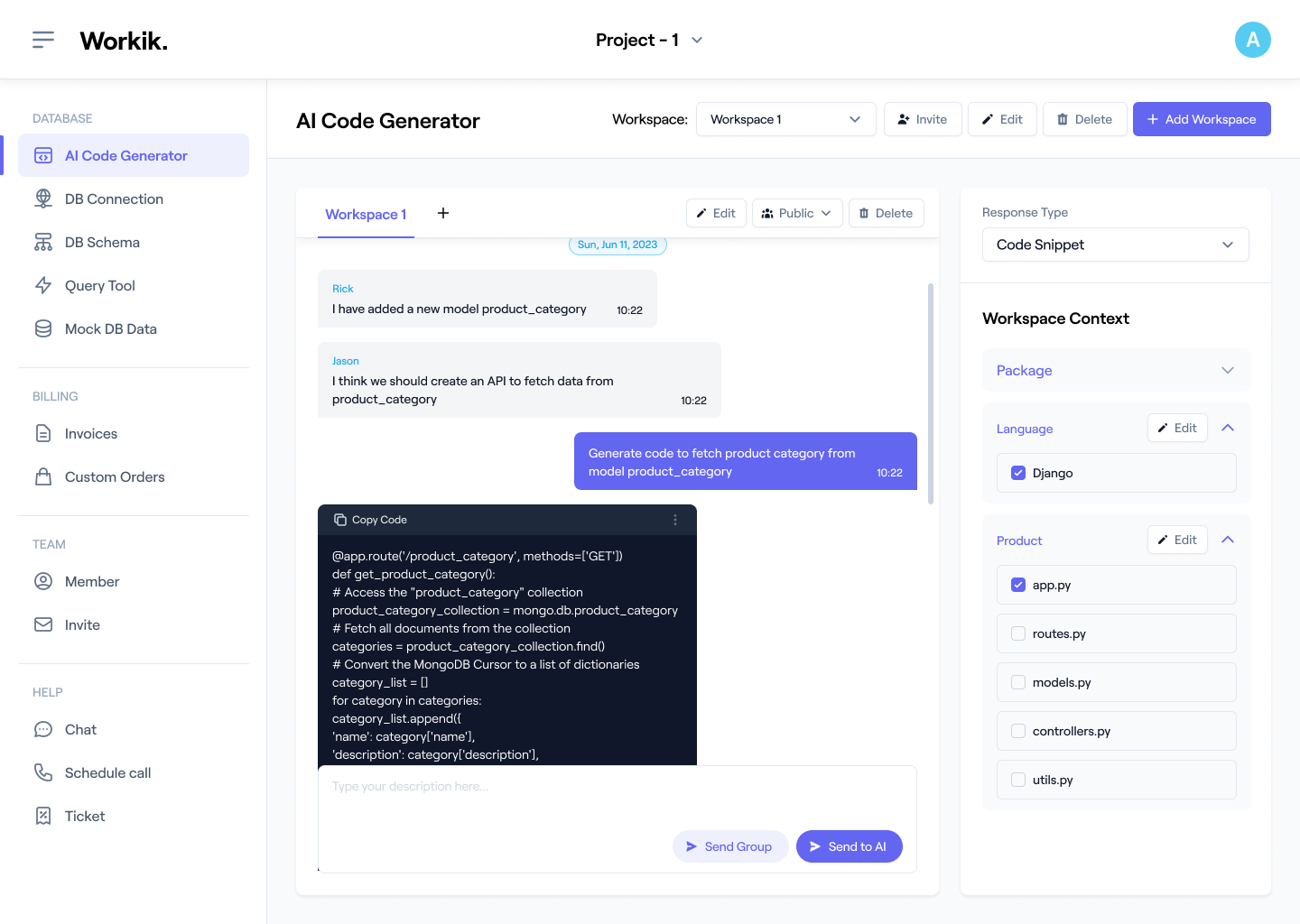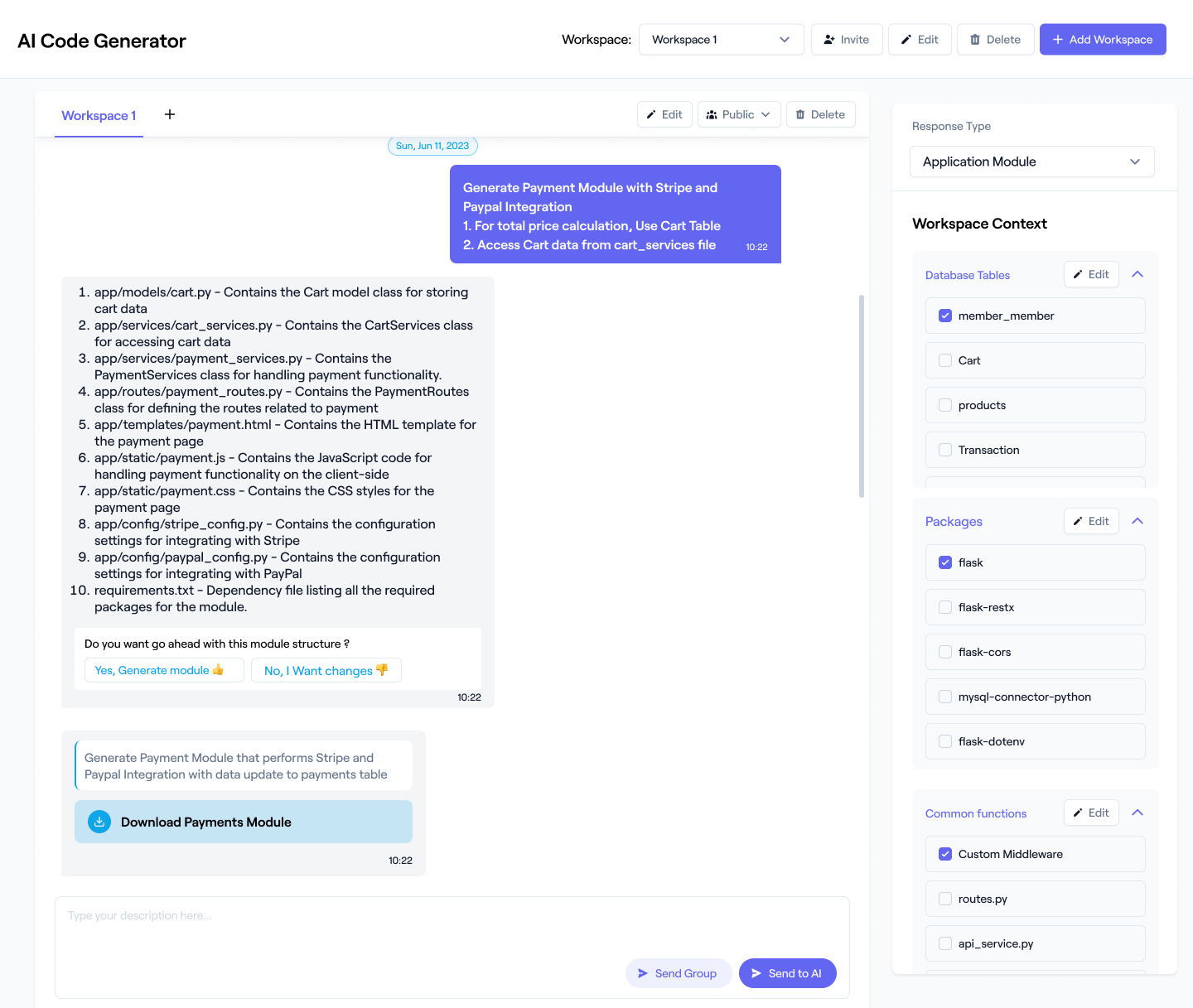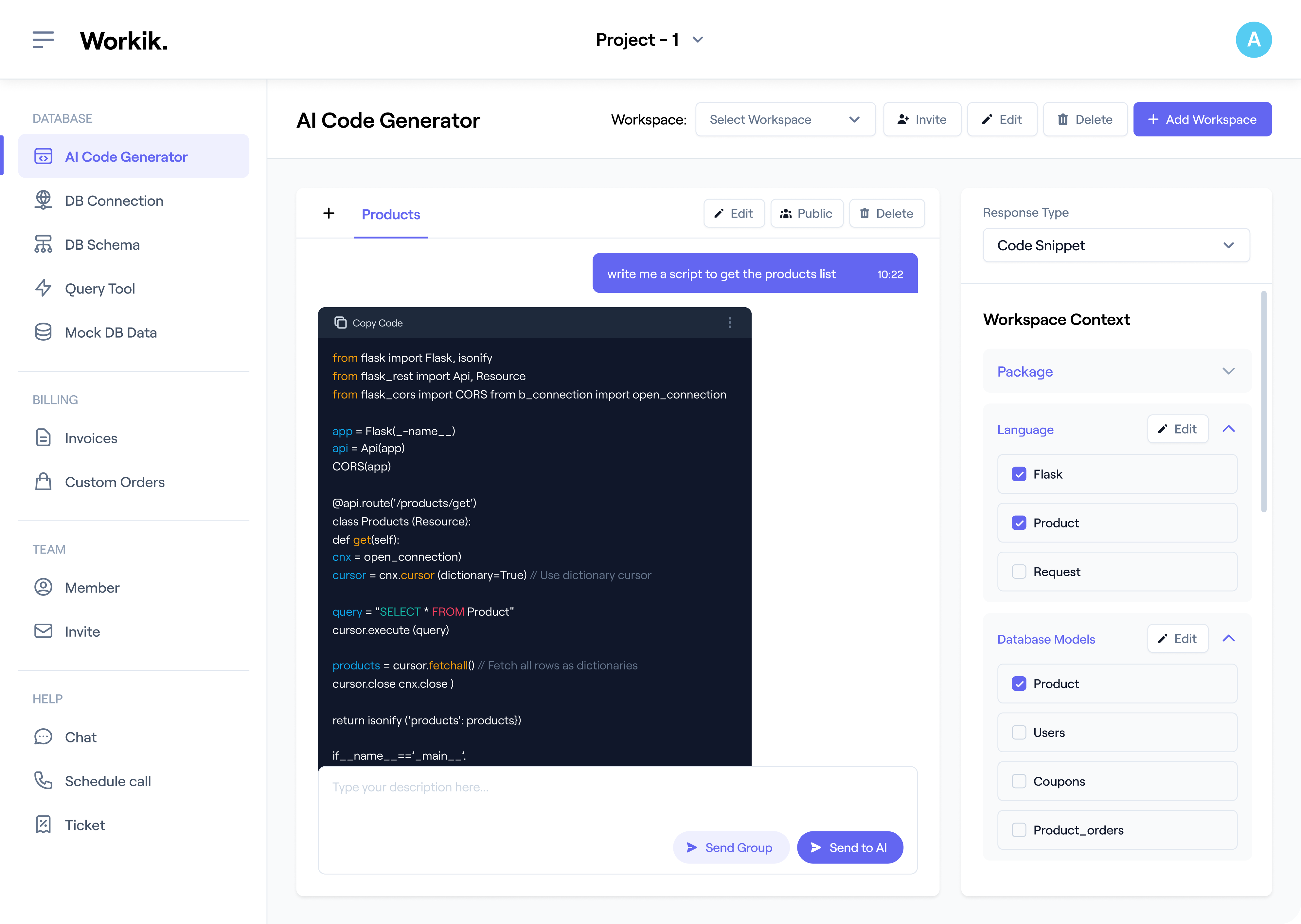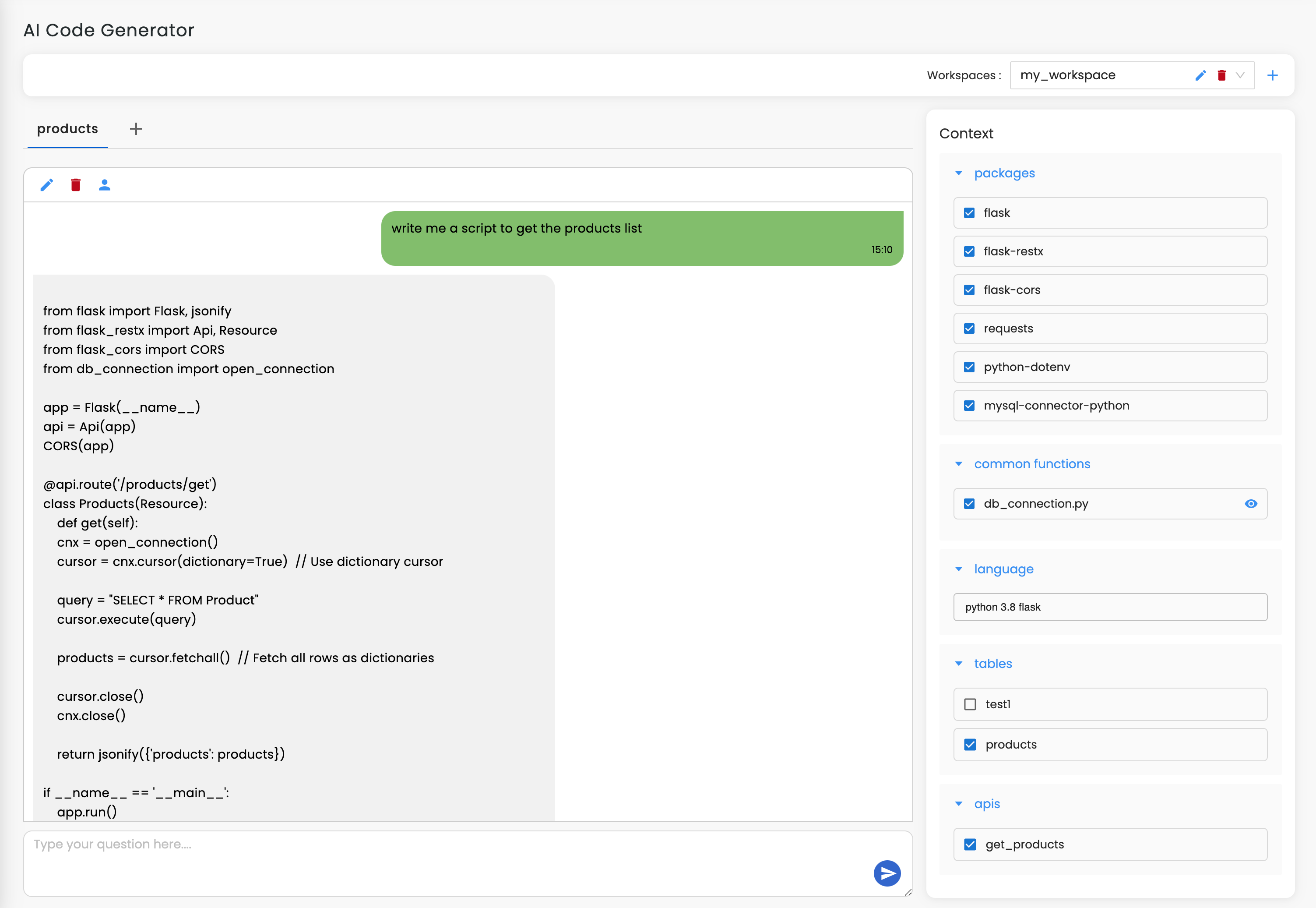
Join our community to see how developers are using Workik AI everyday.
Features

Generate Base Model Code Instantly
AI generates foundational ML model code, from regressions to neural networks, in TensorFlow, PyTorch, and more.

Streamline Data Preprocessing
AI automates data cleaning, normalization, feature extraction, and encoding with Pandas and NumPy, simplifying large dataset handling.

Boost Hyperparameter Tuning
Optimize learning rates, batch sizes, and more with AI-driven Grid Search or Random Search for best results.

Simplify Model Evaluation
AI generates detailed evaluation reports with metrics like accuracy, F1 score, and AUC, including confusion matrices.
How it works
Sign up in seconds with Google or enter your details manually to access Workik’s AI-driven machine learning tools.
Link your GitHub, GitLab, or Bitbucket repositories. Specify machine learning frameworks like TensorFlow, PyTorch, or Scikit-learn, and add dataset schemas or API endpoints for precise AI assistance.
Receive AI-driven suggestions or generate complete ML models from data preprocessing to model training. Whether working on classification, regression, or deep learning tasks, AI offers tailored solutions.
Invite your team to collaborate on your machine-learning projects. Share workspaces and get AI insights for fine-tuning models or deploying them to production environments.


Expand


Expand


Expand


Expand


Expand


Expand


Expand


TESTIMONIALS
Real Stories, Real Results with Workik
Workik's AI made hyperparameter tuning in TensorFlow quick and effortless, saving me hours!

Mathew David
Machine Learning Engineer
AI-generated Scikit-learn models sped up my classification tasks and reduced manual work!

Diana White
Data Scientist
Workik’s AI guided me through data preprocessing and model training, making ML much easier to grasp!

Isabella Murphy
Junior Data Scientist
What are some popular use cases of Workik's AI-powered Machine Learning Code Generator?


Popular use cases for developers using Workik's AI for Machine Learning include, but are not limited to:
* Generate base model code for algorithms like logistic regression, decision trees, and SVMs to kickstart experimentation.
* Automate data preprocessing for normalization, encoding, and augmentation in image or text data.
* Optimize hyperparameters (learning rate, batch size, dropout) to boost model accuracy.
* Deploy prototypes fast with TensorFlow Serving or ONNX for edge testing.
* Fine-tune pre-trained models like BERT or ResNet with AI-driven customization.
* Create evaluation reports with accuracy, F1 score, and confusion matrices for quick assessment.
What context-setting options are available in Workik’s AI for Machine Learning Code Generator?


Workik offers diverse context-setting options for machine learning code assistance, allowing users to:
* Sync with GitHub, GitLab, or Bitbucket to integrate with your existing codebase.
* Specify frameworks like TensorFlow, PyTorch, or Scikit-learn for generating machine learning models.
* Select algorithms such as decision trees, random forests, or neural networks for specific tasks.
* Use libraries like Pandas, NumPy, or Dask for efficient data processing and augmentation.
* Deploy models to AWS, GCP, or Azure, or export them for edge deployment with ONNX or TensorFlow Lite.
How does Workik assist with feature engineering in machine learning?


Workik streamlines feature engineering by automating tasks like feature extraction, dimensionality reduction, and data transformation. It handles categorical encoding and numerical scaling using libraries like Pandas, making datasets training-ready for machine learning models.
How does Workik handle model evaluation in machine learning?


Workik evaluates models using metrics like accuracy, precision, recall, and F1 score, generating reports with confusion matrices and precision-recall curves for deeper insights.
Can Workik automate data augmentation for deep learning tasks?


Yes, Workik automates data augmentation techniques such as flipping, cropping, zooming, and rotating image datasets. These transformations improve training diversity for deep learning models, especially when using TensorFlow or PyTorch.
Generate Code For Free

Machine Learning: Question and Answer
Machine Learning (ML) is a branch of AI that allows systems to learn from data and improve over time without explicit programming. ML models predict or make decisions based on data, commonly used in tasks like classification, regression, and clustering. Techniques include supervised, unsupervised, and reinforcement learning.
Popular tools in machine learning include:
Languages:
Python, R, Julia
Frameworks:
TensorFlow, PyTorch, Scikit-learn
Data Handling:
Pandas, NumPy, Dask
Model Building:
XGBoost, LightGBM, Keras
Training:
Adam, SGD, Grid Search for hyperparameter tuning
Deployment:
TensorFlow Serving, ONNX, Flask
Development Tools:
Jupyter Notebooks, Google Colab, VS Code
Popular use cases for machine learning include but are not limited to:
Computer Vision:
Image classification, object detection, and segmentation using CNNs.
Natural Language Processing (NLP):
Text classification, translation, sentiment analysis with transformers.
Recommendation Systems:
Collaborative filtering, content-based filtering for personalized recommendations.
Time Series Forecasting:
Predictive models for stock prices, weather patterns.
Fraud Detection:
Anomaly detection for financial transactions.
Healthcare:
Disease prediction, medical image analysis, and drug discovery.
Autonomous Vehicles:
Reinforcement learning and sensor data for self-driving cars.
Machine learning offers roles like ML Engineer for building models, Data Scientist for analyzing data, AI Researcher for developing new algorithms, and Deep Learning Engineer for neural network tasks. Model Deployment Engineers handle scaling models, while MLOps Engineers focus on automating the ML pipeline.
Workik AI assists with machine learning tasks by:
Code Generation:
Instantly generate ML models for classification, regression, and clustering.
Model Setup:
Automates deep learning architectures like CNNs, RNNs, and transformers.
Refactoring:
Refactor and clean up code for improved readability and efficiency.
Debugging:
Provide AI-driven insights to resolve code errors and improve performance.
Hyperparameter Optimization:
Fine-tune learning rates, batch sizes, and other parameters.
Deployment:
Deploy models with TensorFlow Serving or ONNX.
Documentation:
Generate documentation for models and pipelines.
Explore more on Workik
Get in touch
Don't miss any updates of our product.
© Workik Inc. 2026 All rights reserved.

